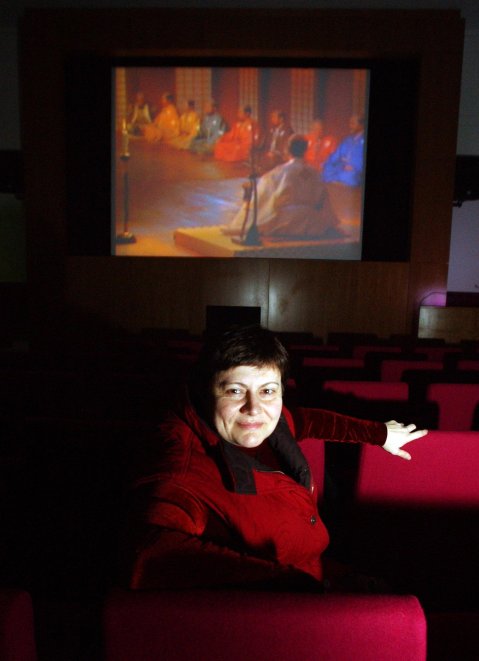|
Press Releases
|
Press Release - Film Festival Yearbook 2 |
|
Ethnic Film Festivals
Minority film festivals are creating live social and political encounters that bring together a host of imagined communities, according to a new book by researchers at the University of St Andrews and worldwide.
Film Festivals and Imagined Communities, the second volume in the Film Festival Yearbook series, brings together essays about festivals that use international cinema to mediate the creation of transnational 'imagined communities'.
Professor Dina Iordanova of the University of St Andrews, editor and publisher of Film Festival Yearbook 2, said:
"Film Festivals are usually associated with glamorous city locations, where celebrities showcase designer outfits on miles of red carpet. But what about the other film festivals, those organised by minority groups for minority audiences - for example Edinburgh's African film festival , the Migrant Worker Film Festival in South Korea, or the festivals set up by activists to cater to displaced populations in the Sahara? These film festivals may be far from the limelight, yet are of at least equal importance in regard to our understanding of the dynamics in the global circulation of cinema."
Film Festivals and Imagined Communities includes discussion of the cultural policies and funding models linked to these festivals, as well as analysis of programming practices linked to these often highly politicised events.
Case studies focus on diaspora-linked festivals that take place around the world - from Bradford to Havana and that feature cinema from places as diverse as Nepal and Kurdistan, Africa and Latin America.
American film critic Jonathan Rosenbaum said:
"The very ambitious aspiration of the Film Festival Yearbook is, quite literally, to define a new area of film study."
Faye Ginsburg, Director of the Center for Media, Culture and History at New York University, said:
"Film Festivals and Imagined Communities opens up new horizons both for those who study media and those who create the significant but often overlooked 'media worlds' where films first get launched: film festivals from the 'periphery'."
Authors include Lindiwe Dovey, Ruby Cheung, Michael Guillén, Jérôme Segal, Miriam Ross, Roy Stafford, Yun Mi Hwang, Isabel Santaolalla and Stefan Simanowitz, Skadi Loist and Marijke de Valck, Mustafa Gündogdu, and Dina Iordanova.
A book launch event, in which Film Festival Yearbook 2 will be presented, will be held at 1500 hours on Sunday March 7, 2010 at the BFI Southbank Filmstore in London.
|
|
Last Updated ( Friday, 26 February 2010 19:59 )
|
|
Professor Dina Iordanova to serve as St Andrews University’s Provost
We are delighted to announce that Professor Dina Iordanova, Chair and Director of the Centre for Film Studies and Principal Investigator of the Dynamics of World Cinema research project, has agreed to serve as St Andrews University’s Provost. Dina's unrivalled energy, skill and creativity will be essential as the University endeavours to expand postgraduate numbers, create an environment conducive to excellence in postgraduate research, and improve the quality of life for the postgraduate population.
Dina will of course continue to act as the Dynamics of World Cinema project’s Principal Investigator. We are also convinced she will be as energetically supportive of ‘all things film’ at St Andrews University as she has been over the years of her direct involvement with the Centre for Film Studies and in her research projects.
Dina will assume the role of the University’s Provost on her return from research leave in August 2010.
Congratulations!
|
|
Last Updated ( Tuesday, 23 June 2009 13:50 )
|
Wonderful news on Stuart Cunningham, Co-Investigator on ‘Dynamics of World Cinema‘!
We are truly pleased to be announcing the Distinguished Professorship conferred to Stuart Cunningham, director of the ARC Centre of Excellence for Creative Industries and Innovation at the Queensland University of Technology in Australia.
Stuart, who is co-investigator on the project Dynamics of World Cinema, spent the month of April 2009 with us in St. Andrews, where he participated in an intense series of research meetings and gave a well-attended talk.
Congratulations on the wonderful achievement, Stuart!
|
|
Last Updated ( Tuesday, 23 June 2009 13:46 )
|
|
Press Release: AROUND THE WORLD IN 2,000 FILM FESTIVALS |
|
Film festivals under the microscope at the University of St Andrews
The global boom in the film industry has resulted in almost 2,000 film festivals taking place all around the world, according to a leading expert in film studies.
Professor Dina Iordanova, Director of the Centre for Film Studies at the University of St Andrews believes that the next decade will see the study of film festivals become just as important as the study of film itself.
The researcher will be joined by film critics, festival practitioners and fellow academics to investigate the phenomenon at a special event in St Andrews this weekend (Saturday 4 April 2009).
The group of experts will gather for the one-day event to examine why a twenty year surge in the interest in films and film-making means that France alone has one festival for every day of the year. The event is part of a two-and-a-half-year project, Dynamics of World Cinema, sponsored by The Leverhulme Trust. The project, led by Professor Iordanova, is currently looking into the distribution and exhibition of international film.
Professor Iordanova, who is convening the workshop, explained, "Over the past twenty years film festivals have proliferated all over the world. It is difficult to provide an exact figure for the number of festivals in operation, but it is well over 1,000 and more likely around 2,000.
"Just as the study of museums and galleries is central to our understanding of arts and heritage, the study of festivals is central to understanding the true scope of global cinema. It is logical, therefore, to expect that in the course of the next decade the study of festivals, a growing yet scattered field, will become central to film and cultural studies.
The workshop is hosted by the Centre for Film Studies at the University and takes place at the Byre Theatre in St Andrews this Saturday (4th April 2009). The discussion, moderated by leading critics (Richard Porton of the Cineaste, Nick Roddick of Sight and Sound, and Michael Gubbins, former editor of Screen International) and academics (Professor Iordanova, Professor Stuart Cunningham of the Australian Film Commission and Dr Ruby Cheung of the Dynamics of World Cinema project) will evolve around festival programming, distribution, funding, digitisation/new media, and cultural policy.
Other participants include: Irene Bignardi (Film Italia, former artistic director of Locarno International Film Festival), Lindiwe Dovey (SOAS, University of London), Janet Harbord (Goldsmiths College, University of London), Skadi Loist (University of Hamburg), Lucy Mazdon (University of Southampton), David Slocum (The Berlin School of Creative Leadership), Núria Triana Toribio (University of Manchester), and Marijke de Valck (University of Amsterdam).
Professor Dina Iordanova continued, "This workshop provides a rare opportunity for productive conversation about the state of the field and current research agendas. I am happy to see the enthusiastic support from so many renowned film scholars and critics. I hope that this event will inspire more and more related events and scholarly work in the field of film festival research."
ENDS |
|
Last Updated ( Friday, 03 April 2009 00:54 )
|
|
From Bollywood to YouTube |
|
Released: Thursday 24 July 2008, St Andrews, UK

From Bollywood to YouTube, an academic at the University of St Andrews is to investigate the ways in which non-mainstream film reaches the masses.
Professor Dina Iordanova, St Andrews' first Chair of Film Studies and a leading international authority in her field, will receive a prestigious grant from The Leverhulme Trust to carry out the study "Dynamics of World Cinema: Transnational Channels of Global Film Circulation".
The innovative project will examine the circulation of global cinema by comparing the four main channels: the system of global Hollywood, the international film festival circuit, various alternative production centres like Bollywood as well as internet-enabled channels such as YouTube.
Professor Iordanova said, "We know a lot about Holywood's global operation, and we have all sorts of box office data and charts on them. But we know next to nothing of the other side of the equation, of those films that are not in the blockbuster sphere, that are distributed via less visible channels but are still popular.
"In the course of our study, we will establish how much money non-Hollywood films actually make and are likely to reveal that they enjoy a growing domestic and international commercial success.
"The study will examine the phenomenal growth of film festivals around the world and will assess if they indeed have become an independent distribution circuit. We will also explore the film distribution for ethnic minorities (for example, Bollywood imports), and reveal that it is an operation of astonishing commercial success.
"Finally, we will also assess the impact that new internet-enabled channels such as YouTube, online forums and download sites, have on the changing dynamics in world cinema."
Professor Iordanova and her son George (12) at the Ghibli Museum in Tokyo in November 2007.

The £240,000 grant will allow Professor Iordanova to undertake the pioneering two and a half year investigation into the ways film travels nowadays to reach a growing and increasingly diverse community of viewers that are interested in getting more specific content than the blockbuster playing at the cinema around the corner.
She explained, "What makes us distinct in relation to earlier studies is that we will correlate all those diverse strands of film circulation that are extremely active nowadays but somehow remain below the radar. By putting all information into comparative perspective and by revealing patterns of interaction, we will show the real dynamics of world cinema. We expect to bring to the attention traditionally ignored aspects that will undermine the view of Hollywood's undisputed global dominance."
Originally from Bulgaria, and having worked in Canada, the US, and England, Professor Iordanova's background is in philosophy and aesthetics. Soon after acquiring her PhD in 1986, she realised she needed images to come along with the theoretical concepts. She made a profession out of her habit of seeing a movie a day, and switched to the new field of film studies in 1993. Today, she has numerous publications on in international cinema to her credit. She has recently edited a special issue of Film International dedicated to film festivals, and is now working on a book chapter about recent Asian epic cinema.
She continued, "This is a radically interdisciplinary project, which brings together transnational film and media studies, globalisation and diaspora studies, political economy and humanistic scholarship. Given the Trust's interest in major issues of contemporary culture, The Leverhulme was the best organization to fund it. We are truly grateful for their recognition."
Professor Stuart Cunningham from Queensland University of Technology in Brisbane, a leading specialist in the area of creative industries, is co-investigator on this unique and innovative project. He will spend a month in St Andrews during the second phase of the research. Two post-doctoral fellows, one from Hong Kong and the other one from New York City, are joining the team set to start work in October.
ENDS
|
|
Last Updated ( Tuesday, 10 February 2009 10:31 )
|
|
|
|
|
|
|

